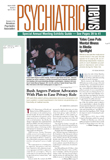It is looking more and more as though a stretch of chromosome 22 called the q11-13 region contains genes that are involved in schizophrenia.
For instance, the gene or genes that cause velocardiofacial syndrome come from this region, and about one-third of patients with velocardiofacial syndrome experience schizophrenia-like symptoms. A gene that has been linked with schizophrenia, called the COMT gene, also comes from this region.
And now three more genes that derive from this area have been found to engage in more expression—that is, in more mRNA transcription—if they come from the brains of persons who had schizophrenia than if they come from the brains of persons who had major depression, bipolar disease, or no mental disorder.
The finding comes from Sabine Bahn, M.D., Ph.D., a clinical lecturer in psychiatry at the University of Cambridge in England, and her colleagues and is reported in the April 2 edition of the Proceedings of the National Academy of Sciences.
The three genes are called the apolipoprotein L1, L2, and L4 genes. The apolipoprotein L family of genes makes lipoproteins, which in turn play a central role in cholesterol transport. Cholesterol is important in cellular processes during brain development and in the adult brain. The fact that the apolipoprotein L1, L2, and L4 genes are on expression overdrive in brains of people with schizophrenia suggests that they might play a causative role in schizophrenia, Bahn told Psychiatric News.
Bahn and her colleagues will now investigate whether apolipoprotein L1, L2, and L4 genes taken from the bloodstream of schizophrenia patients are also overly expressive. “If this is the case,” she said, “there could be a possibility of using the genes as a diagnostic tool.”
However, she does not foresee that their results will lead to any new ways of treating schizophrenia in the near future. Her suspicion is that the apolipoprotein L1, L2, and L4 genes are only “a first cue hinting at a more complex pathology of specific molecular pathways, like the tip of an iceberg above water.”
Bath and her team used high-technology methods called microarrays and differential display techniques to identify the overexpression of the apolipoprotein L1, L2, and L4 genes in schizophrenia.
Karoly Mirnics, M.D., an assistant professor of psychiatry and neurobiology at the University of Pittsburgh, was the first investigator to publish microarray results obtained from brains of people with schizophrenia and controls and is familiar with Bahn’s research. “Bahn’s findings are very important in the process of uncovering schizophrenia susceptibility genes and processes that may be associated with the symptoms of the disease,” Mirnics told Psychiatric News.
The research by Bahn and her colleagues was financed by the New Zealand Neurological Foundation, the Health Research Council of New Zealand, the Theodore and Vada Stanley Foundation, and the National Alliance for Research in Schizophrenia and Depression.
An abstract of the article “Gene Expression Analysis in Schizophrenia: Reproducible Upregulation of Several Members of the Apolipoprotein L Family Located in a High Susceptibility Locus for Schizophrenia on Chromosome 22” is posted on the Web at www.pnas.org/cgi/content/abstract/99/7/4680. ▪
